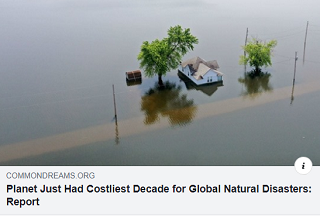Economic Losses from Climate-Fueled Disasters in the Last Decade: $3 Trillion

Here’s a challenge for you. Interview for a job at a large insurance company that underwrites damage to buildings in coastal cities, and tell the guy that you don’t believe in climate change. Try to make the discussion continue another five minutes until he points to the door and asks you to leave.
Want to deny science while plying your trade as a hair stylist or taxi driver or delicatessen manager? No problem. As someone who’s responsible for high-value assets that are exposed to climate-driven devastation? Sorry, that won’t work.

Craig,
As an attendee at the WEF, (possibly my last year)I’ve always enjoyed staying in the Graubünden Canton in Switzerland.
The WEF is always an interesting experience, and apart from the official conferences, presentations, social events etc, the unofficial attendees and events are also fascinating.
All supervised by the Swiss authorities in a very polite, efficient but strict fashion.
One of the highlights for me was the appearance of M/s Ivanka Trump. Ivanka was among the speakers who also included along with Marc Benioff, CEO of Salesforce, at the “Reskilling Revolution Conference”
M/s Trump spoke with considerable passion and conviction to a packed audience. Her speech was impressive and surprisingly well received as she explained the depth of her father’s workforce initiatives.
It was therefore saddening to witness the highly misogynistic coverage by various leftist media outlets, especially those who are usually the most outraged at real or imagined denigration of women.
Most of these media outlets concentrated on her hairstyle,(Guardian NYT) her gain in weight making her breasts appear larger, (CNN, CBS, Vanity Fair Daily Mail) that she wore a “$1,940 blue Max Mara suit jacket and matching $595 pants”, (NYT, USA today, CNN, Guardian ) Many other media outlets shared VOX’s opinion in condemning her for being thirty-eight and a mother-of-three, and as such should stop looking like a teenager.
CBS and the BBC shared a fascination for her added a navy polka-dot shirt and blue high heeled shoes and $3,980 cream Gucci coat.
It not so much that most of the information was wrong or inaccurate, but that it was the sort of demeaning reporting these outlets usually condemn with great outrage!
Hypocrites!
Finally, the NYT thundered about the cost of the Secret Service bill for hire vehicles costing over $30,000. The Daily Beast suggested that the agents could have rented electric bicycle!
Craig,
I decided to accept your challenge!
Finding myself in the same restaurant as two senior Actuaries from our insurance division, I decided to put your theory to the test and inquire how insurance companies factor “climate Change” in actuarial tables.
Surprisingly, they don’t!
The misconception arises as the insurance industry does prepare and release many studies based on a wide variety of scenarios’ including various “climate change predictions.
But these “scenario’s” are not used to set premiums or rates.
I was surprised to learn the Insurance and Assurance Industry statistics do not reflect a rise in the numbers of natural disasters, especially hurricanes, over the last 5 decades.
What has risen dramatically, is methods of detection and monitoring, new descriptions and categories, and a dramatic increase in habitation of affected areas.
Costs have risen due the huge increase of wealth and urbanization of affected areas.
An example was provided of a recent category five hurricane hitting an small island.
Only 20 years ago the damage would have been limited to a few small fishing boats. small yachts and beach shacks. At the most a hundred or so thousand thousand dollar in claims could be expected.
When the hurricane hit last year, the village had grown to a town of 12,000 inhabitants, with two large marinas, three resorts, several hotels, expensive houses and shops, infrastructure etc.
The total losses to the insurance companies was more than $480 million ($70 million for one luxury yacht alone).
Insurance is an actuarial business. The industry neither supports, nor “denies” climate change. The industry prepares for any and all possible contingencies. (it even has a scenario worked out for meteorite damage).
I’m afraid you will have to look for another source to confirm your alarmist predictions.
Hmmm, now I come to think about it, don’t you live in an affluent beach-side town?